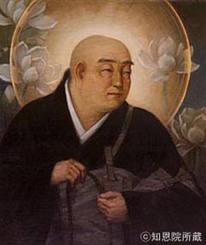 Hounen (1133-1212) was a Tendai monk who became convinced that traditional Buddhist practices were not sufficient for most people to attain enlightenment. The increasing civil disorder that prevailed convinced him that this was the age of Mappou (The Latter Days of the Law) in which it would be impossible for individuals to become enlightened through jiriki (one’s own strength.)
Hounen (1133-1212) was a Tendai monk who became convinced that traditional Buddhist practices were not sufficient for most people to attain enlightenment. The increasing civil disorder that prevailed convinced him that this was the age of Mappou (The Latter Days of the Law) in which it would be impossible for individuals to become enlightened through jiriki (one’s own strength.)
 Hounen did not invent the story of Amida Buddha and his Pure Land, but he was the first Japanese religious leader to offer the hope of a practical way to become enlightened without spending years as a monk or a nun. Japanese aristocrats often became monks upon retirement, but ordinary people who could not afford such things could only hope that if they contributed to the support of the monks they might gain enough merit to be reborn as one. Hounen’s teaching attracted many followers, particularly among the lower classes.
Hounen did not invent the story of Amida Buddha and his Pure Land, but he was the first Japanese religious leader to offer the hope of a practical way to become enlightened without spending years as a monk or a nun. Japanese aristocrats often became monks upon retirement, but ordinary people who could not afford such things could only hope that if they contributed to the support of the monks they might gain enough merit to be reborn as one. Hounen’s teaching attracted many followers, particularly among the lower classes.
However he also attracted fierce opposition from the Buddhist establishment. In 1207 the Emperor Go-Toba issued a decree banning Pure Land practices and exiling the sect’s leaders. The ban was lifted in 1211, but Hounen died soon after returning to Kyoto.
Shinran (1173-1263) was a younger Tendai monk who became Hounen’s follower, but left to form his own school, Joudo Shinshuu (New Pure Land Sect, often called “Shin Buddhism” in English.)
Hounen encouraged his followers to repeat the nembutsu as many times as possible to maximize their chances of reaching the Pure Land. (You sometimes hear anime characters rattling it off very rapidly: “namandabunamandabunamandabunamandabu.”) Shinran said that this was just another form of jiriki. He taught that Amida Buddha, in his great compassion, immediately grants admission to the Pure Land to anyone who sincerely requests it. Repeating the nembutsu merely serves to thank Amida and feel his call to the Pure Land.
 Some found this formulation even more disturbing, especially since Shinran said that even criminals would be welcomed into the Pure Land. Officials wondered why anyone would bother to obey the law. Shinran was also exiled in 1207 but after the ban was lifted he was able to continue his work for many years, living to the age of 90.
Some found this formulation even more disturbing, especially since Shinran said that even criminals would be welcomed into the Pure Land. Officials wondered why anyone would bother to obey the law. Shinran was also exiled in 1207 but after the ban was lifted he was able to continue his work for many years, living to the age of 90.
Contrary to what some detractors have claimed, most Pure Land Buddhists do not just recite the nembutsu and then feel free to live a life of depravity. Believers are encouraged to meditate, attend regular meetings to study the dharma, and apply it in their daily lives.
Today the Joudo Shuu and Joudo Shinshuu sects account for the vast majority practicing Buddhists in Japan. Shin Buddhism in particular enjoyed a major revival after World War II when it was embraced by many Japanese who were disillusioned by the failed promises of State Shinto.
When an anime dub or subtitle refers to someone “going to Heaven,” more often than not the characters are actually talking about the Pure Land (joudo or gokuraku.) A literal reference to “Heaven” would be ten or tendo.

